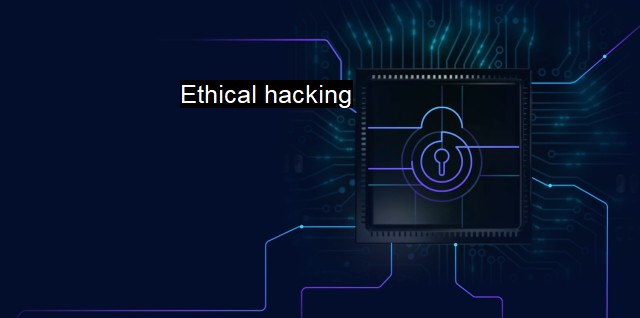What is Ethical hacking?
The Art of Defense: Examining Ethical Hacking as a Key Element in Cybersecurity Strategies
Ethical hacking, often referred to as penetration testing or white hat hacking, is an approved hacking activity conducted to identify vulnerabilities or weaknesses within a network or a system. It plays a crucial role in maintaining network security within the cybersecurity world by identifying potential areas of risk so that proper remediation measures can be undertaken.The concept of ethical hacking contradicts the negative connotations linked with the term 'hacking.' Whereas covert hacking revolves around unauthorized infiltration into a network with ill intent, ethical hacking is purely crafted with the intent of assessing and improving the security structure of that network or system. Ethical hackers operate legally with the system owner's full knowledge and express permission. Their goal is to emulate the tactics used by cybercriminals to unearth system vulnerabilities before the criminals can exploit them, thereby leading to data theft, financial loss, or operational chaos.
Attempting to compromise a computer system or network environment by adopting hacking techniques and tactics is part of the ethical hacker's modus operandi. By doing so, they pinpoint frailties and susceptibilities that can potentially be misused by malicious actors or hackers. This proactive approach helps in bolstering the way these machines and networks operate, thereby toughening their resilience towards cyber-attacks.
Ethical hackers often employ various tools to aid in their quest for system vulnerabilities. These include intrusion detection systems, packet sniffers, exploit tools, and vulnerability scanners. Their skills encompass a wide range of demonstrated proficiency in areas like computer programming, computer network operations, cybersecurity, systems engineering, and others linked with the IT domain. Companies or organizations usually hire these professionals to run extensive penetration tests on their networks to analyze security posture.
When it comes to the relationship with antivirus tools, ethical hacking and antivirus programs both strive for a secure cyberspace, yet they operate at different levels. An antivirus essentially shields a system from an incoming risk like malware or ransomware. Its task is to detect, prevent, and remove such malicious software. Because its function is primarily reactive, if a new, unrecognized malware infiltrates a system, the antivirus might not be effective.
Here is where the contribution of ethical hacking becomes palpable. The proactive scrutiny through ethical hacking helps provide a robust overarching security structure, patching up the areas unattended by antiviruses. This concerted approach of using both antivirus tools and ethical hacking provides multi-layered security checks and makes a hard nut to crack for anyone trying to compromise system security.
Ethical hacking is not limited to countering cyber threats but also extends its territory to maintain the robustness of system defenses. After determining the vulnerabilities, ethical hackers not only report the weaknesses to the respective authorities of the organization for mitigation measures but also advise on how to establish new policies or alter procedures to enhance cybersecurity in the future.
Ethical hacking has become an integral part of cybersecurity, working hand in hand with antivirus programs to provide comprehensive security measures. It guarantees a proactive stance towards system security, combating potential threats preemptively and fortifying defenses in the continually evolving cyberspace. The building and maintaining of a secure digital landscape rely considerably on the commitment and professional acumen of ethical hackers. In an era where cyber threats loom plentifully, their role stands robust, indispensable, and continues to evolve according to the challenges encountered.

Ethical hacking FAQs
What is ethical hacking?
Ethical hacking is the process of penetrating a computer or network system with the intention of finding security vulnerabilities or identifying potential threats. Ethical hackers carry out this activity with the permission of the owners of the system, in order to protect the system from malicious attacks.What is the difference between ethical hacking and illegal hacking?
The main difference between ethical hacking and illegal hacking is that ethical hacking is done with the permission of the system owner, while illegal hacking is done without permission. Ethical hacking is carried out for the purpose of identifying vulnerabilities and preventing cyber attacks, while illegal hacking is done for personal gain or malicious intent.What are some common techniques used in ethical hacking?
Some common techniques used in ethical hacking include vulnerability scanning, social engineering, password cracking, and network sniffing. These techniques are used to identify potential weaknesses in a system that could be exploited by hackers.Why is ethical hacking important in cybersecurity?
Ethical hacking is important in cybersecurity because it helps identify vulnerabilities in a system before they can be exploited by attackers. By conducting ethical hacking tests, companies and organizations can strengthen their security posture and prevent cyber attacks. Ethical hacking can also help organizations meet compliance requirements and protect their reputation.| | A | | | B | | | C | | | D | | | E | | | F | | | G | | | H | | | I | | | J | | | K | | | L | | | M | |
| | N | | | O | | | P | | | Q | | | R | | | S | | | T | | | U | | | V | | | W | | | X | | | Y | | | Z | |
| | 1 | | | 2 | | | 3 | | | 4 | | | 7 | | | 8 | | |||||||